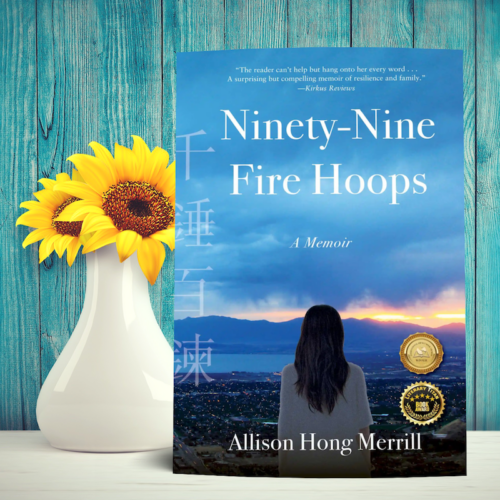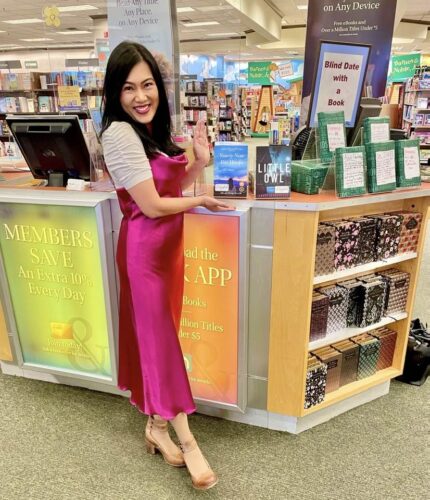Allison Hong Merrill, 2018 MFA in Writing
VCFA class of 2018 MFA in Writing alumnx Allison Hong Merrill is an award-winning, bestselling author. You may know Hong Merrill from her debut, much celebrated memoir, Ninety-Nine Fire Hoops (She Writes Press, 2021), or her young adult adaptation of the best-selling novel The Paper Daughters of Chinatown (Shadow Mountain Publishing, 2023).
In early 2024, VCFA interviewed Hong Merrill about Ninety-Nine Fire Hoops, which she worked on while attending VCFA; the story behind and the impact of her memoir, and her upcoming projects. Read excerpts from our conversation below.
The Q&A
Q: What led you to studying at VCFA?
A: Nine years ago, my literary agent submitted my memoir, Zhongshan Road, to twenty-six publishers. All rejected it. In her email, the president and editor-in-chief of Penguin said my story was fascinating, but my writing needed help.
I was writing in English as a foreign language that didn’t share any linguistic roots with my native tongue. But I imagine every editor in the U.S. would say, “So what, who cares?” “This is business, be professional.” Be professional, that’s the first lesson I learned as a writer. So when my agents and I parted ways, I didn’t take it personally.
That same year I attended the Storymakers Writer’s Conference where one of the keynote speakers was Martine Leavitt, a faculty member of VCFA’s Writing for Children and Young Adults program. She raved about where she worked, dubbing it the “Harvard of Writing.” She might’ve actually meant WCYA was the most prestigious program in the nation. If so, I misunderstood her.
If anyone in the audience that day needed to know there was a world-renowned writing program out there, it was me. I’d been thinking about that rejection letter from Penguin and dying to improve my writing. So, a few months after the conference, in October 2015, I submitted an application to the VCFA Writing program, and arrived in Montpelier the day after Christmas for the 2016 Winter residency, believing I was attending the Harvard of Writing. Now I know I did.
Q: For those who might have not yet read your work, could you offer a summary of your award-winning memoir Ninety-Nine Fire Hoops?
A: Ninety-Nine Fire Hoops is a true story of a Taiwanese immigrant bride––disowned by her father, abandoned by her American husband, and inarticulate in English––who defies cultural expectations and creates her own destiny.
Chinese culture conditioned women to silently wait for men’s permission to speak or act. Women were expected to obey their father, husband, and sons in widowhood.
Born in Taiwan and raised in Chinese culture, Allison Hong’s trouble starts when she disobeys her father’s demand to stay in their faith tradition, Buddhism, and joins the Church of Jesus Christ of Latter-day Saints. Six years later, she drops out of college to serve a mission—a decision for which her father disowns her on Chinese New Year’s Eve, 1994.
After serving her mission in Taiwan, Allison comes to the U.S. to continue her education. She marries her Chinese-speaking American boyfriend, Cameron. But just over a year later, a week before Thanksgiving in 1996, she returns home to their apartment and is shocked to discover that Cameron has abandoned her, taken all their money, moved out, and filed for divorce.
Twice in her life Allison is homeless and penniless. Which means when others celebrate major holidays with their families and loved ones, she is alone on the street, shivering in the cold, looking for forgotten change in payphone coin slots. In those desperate moments, Allison, a woman of color, chooses to break social bonds and cultural expectations to chart her own path.
An award-winning memoir, Ninety-Nine Fire Hoops is for anyone who has struggled with gender inequality, racism, and immigrant injustice.
Q: Could you take us back to the start of Ninety-Nine Fire Hoops? How did the journey of writing this memoir begin, and what importance and impact did it hold for you as a writer?
A: The inspiration for the opening scene of Ninety-Nine Fire Hoops came to me on the last day of my first VCFA residency in Winter 2016, during the graduation ceremony. As soon as I got home from the residency, I started working on the story and sending segments of the manuscript to my advisor for feedback. Four semesters later I finished the book-length rough draft. It took me another year to revise it. Then, in 2019, the query process began. I received 149 rejections.
According to those agents who passed on my project:
- memoirs were extremely hard to sell,
- there was not an audience for Taiwanese immigrant story,
- my platform was not big enough.
At the time I was 46 years old. A few of my elementary school classmates in Taiwan had passed away from illnesses. Mortality became a weighty matter on my mind. Even though I wasn’t ill, I didn’t know how many more years I have to live. There were other books I wanted to write. Since I started writing in 2006, for 13 years, all I’d ever received were rejections. How tragic would it be that after working so hard for so long, I never got to share any stories because all these agents and editors––strangers––said no?
It was my friend Angie’s three-year-old granddaughter, Emma, who inspired me to greenlight my own book.
One day, Emma asked Angie for a cookie. Angie said no.
“Okay, but can I have a cookie?”
Again, Angie said no.
Emma walked away, but skipped back a few minutes later and asked for a cookie. Angie said no the third time. Emma left wordlessly. Minutes later, Angie was shocked to find Emma on the kitchen counter, cookie crumbs on her shirt, chocolate goo smeared over her cheeks, her chubby hand taking the last cookie out of the jar.
Emma convinced me that if I wanted a cookie but all the big guys said no, I should get a cookie anyway, on my own.
You might’ve heard that Ninety-Nine Fire Hoops was hybrid published in 2021.
Q: How have you seen Ninety-Nine Fire Hoops impact its readers?

A: It’s surprising to know that many of the readers are married men. They reached out to tell me their wives are from China, Taiwan, Hong Kong, Malaysia, Singapore. Some of these readers’ wives are second, third, or fourth-generation Chinese-Americans. And they all learned some aspects of Chinese culture they had never heard of while reading Ninety-Nine Fire Hoops.
It’s especially heartwarming to know that these readers now have a better understanding of the struggles their immigrant parents, neighbors, and friends experienced. When readers tell me Ninety-Nine Fire Hoops helped them develop a greater appreciation for the sacrifices their pioneer parents/grandparents made to give them a better life, they give me the most precious gift I can ever ask for. And I’m grateful.
Q: Themes of love and understanding are prevalent in your work. In your bio, you even say “Allison Hong Merrill is a loveaholic, a Taiwanese immigrant, and an award-winning & best-selling author who shares her Chinese culture with strong storytelling skills to create empowering memoirs, to build understanding and love.” Can you speak more to your dedication to love, kindness, and understanding as a writer?
A: The poet Grace Noll Crowell (1877-1969) wrote, “Because I have been given much, I too must give.” That’s how I feel. I’ve been given much love, kindness, and understanding, so I, too, must give.
In this fallen world, there’s no way we can be perfect, but there are different ways we can be great. Rarely does anyone regret being kind, loving, forgiving, understanding, or nonjudgmental, because all those chosen actions are synonymous with greatness. Ultimately, the only permanent solution to the poverty of this fallen world is love. Kindness and understanding are just the fruit of love. And if there’s one message I hope my work offers the reader, that is it.
Q: You have two works-in-progress: Ninety-Nine Lost Fathers and the Six Sage Society. What are these books about and what has the process of creation been like for each?
A: Six Sage Society is an upmarket novel with historical elements. Here’s the logline:
In Mongolia, a society of imperial brotherhood anticipates the fulfillment of a two-thousand-year prophecy, but when Zolzaya––a starving surrogate mother––arrives, can the brotherhood continue to keep their family secrets and prevent an imminent revolution?
Based on my family history, I got inspiration for this story back in 2012, and have been drafting it on and off over the years. My ambitious dream is to send the manuscript to beta readers by the end of this year.
My other work-in-progress is Ninety-Nine Lost Fathers, a stand-alone memoir with the potential to be the prequel to my debut memoir, Ninety-Nine Fire Hoops.
Ninety-Nine Lost Fathers tells a hundred-year Chinese family saga that starts with an arranged matrilocal marriage in Taiwan and ends four generations later with an interracial marriage in Texas, exploring my family history of genetic sexual attraction, in-clan adoption, and disowning kids. Moreover, the Taiwanese Central Government has been keeping a secret from us for decades about our lineage, like it was a matter of national security. As if cursed, children in my family always struggle to know our origin, and in turn, our identities.
Remember my first memoir manuscript, Zhongshan Road, that didn’t sell? Well, Ninety-Nine Lost Fathers tells that same story, but better. My ambitious dream is to send this manuscript to beta readers by the end of this year too.
Q: How can interested readers best keep up with and support your work?
A: Please consider signing up for my monthly email, and please kindly leave a review for my books on Amazon. Thank you so much!

